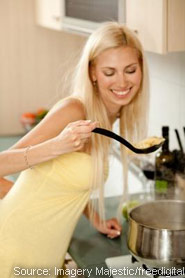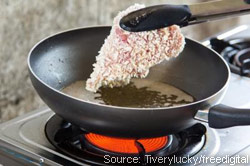Cooking is a trial and error process, and when you're learning the basics, it can be easy to botch things up. Even the most seasoned chefs screw up once in a while, so don't let any setbacks keep you from your kitchen. Read on for some of the most common cooking mistakes we all make and the best ways to avoid them.
You didn't read the recipe first
Many cooking errors can be avoided if you are properly prepared. Reading the recipe as you go can cause you to miss important details that will negatively affect the outcome of your dish. Before you even begin preparing your ingredients, sit down and read through the recipe step by step to know what you are getting into. Look for actions like chop, whip, slice, and mince to know what you will have to do before you even begin cooking. Get out
all of your ingredients and cooking tools so you have everything you need accessible before you turn on the heat. You don't want to be scrambling for a necessary item after you have begun sautéing your garlic-it burns quickly.
Your pasta is gummy

Boiling pasta may seem foolproof, but it can easily go wrong. Not using enough water, dumping too much pasta into the pot, and not letting the water get hot enough can all result in a mouthful of mushy macaroni. Make sure your water is brought to a hard boil before adding your pasta-if it's only bubbling a little, it's not ready. Also make sure you have enough water for the pasta and a big enough pot for it to breath. Four quarts per pound is the standard water to pasta ratio for firm and delicious noodles.
You didn't preheat the pan
When sautéing anything, be it fish, meat, or veggies, the pan must be hot enough to seal in the juice and properly brown the outer surface. If the pan is cold, the food may stick, or end up soggy. Heat your cooking surface on high for several minutes, and then add your oil. Once it begins to sizzle, you can add your food.
You crowded your pan
Overfilling your pan with food will prevent it from cooking evenly and properly. It also traps heat and creates steam, which will prevent your food from browning and result in sogginess. If you're concerned about preparing your ingredients in smaller portions because your first batch will grow cold while you cook the second, simply keep it in a covered dish or in the oven set at a very low temperature to stay warm.
You didn't taste as you go
The best chefs all know that frequent taste-testing is the best tool at your disposal. If you have added too much of one ingredient, you can counteract your mistake easily if you catch it mid-cook. However, if you don't taste your dish until your work is complete, it will be difficult to correct your error. Every so often, take a quick dab to ensure your sauce/filling/soup, etc. is shaping up deliciously. Not enough salt? Too much garlic? Too sweet? Too sour? Adding a little more of one ingredient can fix the offensiveness of another.
Your meat is tough
Cooking meat can be one of the more difficult cooking techniques to master. Depending on the type of meat you are preparing and your personal preferences, there are different methods, temperatures, and cooking times required to get the proper results. Cooking your meat for too long or on too high of a setting will result in a charred, tough, and chewy outcome. Make sure you fully understand the instructions for preparing the particular type and cut of meat to your liking.
You didn't heat your oil enough
If you're frying potatoes, breaded cutlets, or fish, it's imperative to make sure your oil is piping hot before adding your food. If the oil is too cold, the food will simply absorb it, resulting in soggy, oil-soaked vittles. The oil should be at least 350 degrees, which you can check with a deep fry thermometer, or by simply touching the corner of whatever you're frying to the pan. If the oil is hot enough, it should begin sizzling right away. Good oils for frying include canola, safflower, grape seed, and peanut because they have a high smoking point.
Substituting dry herbs for fresh

While some recipe substitutions do no harm, others can completely wreck your meal. If your recipe calls for two tablespoons of fresh tarragon and you opt to use the same amount of the dried stuff in your cupboard, it will completely throw off the taste of your meal. Some fresh herbs, such as parsley and basil, carry much more flavor than their dry counterparts. Others, such as oregano and tarragon, are much stronger and more fragrant when dried, and will overpower the flavor of your dish.
Turning the food too often
If you want your meat or fish to properly brown on the edges, you have to resist the urge to keep flipping, especially with breaded items like pork chops. Cooking evenly on both sides requires a little patience, but will ensure a proper sear and prevent sticking and breading loss. If you can't get your spatula seamlessly under your cutlet or fillet, it's not ready to be turned yet.